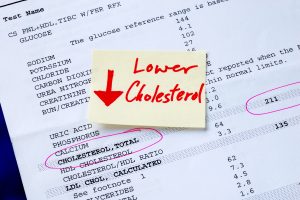 How healthy is your cholesterol? Along with the damage potential it has on your cardiovascular system, new research has found that cholesterol may play a role in a cellular pathway linked to cancer.
How healthy is your cholesterol? Along with the damage potential it has on your cardiovascular system, new research has found that cholesterol may play a role in a cellular pathway linked to cancer.
Cholesterol has been associated with cancer in previous research; one 2014 study from the United Kingdom linked women with high cholesterol to increased risk of breast cancer.
Advertisement
The new study, led by Wonhwa Cho of the University of Illinois at Chicago and published in Nature Communications, looked at the signaling pathways that cells use to carry out their myriad activities in the body. But there can be too much of a good thing.
How healthy is your cholesterol?
In mature cells, over-activity of a certain pathway called “canonical Wnt” is linked to cancer development, Medical News Today reported. The over-activity in the canonical Wnt encourages the cell growth and development of cancer cells.
Where does cholesterol come into play? The researchers discovered that a particular element – cholesterol – binds to a protein to direct whether a signal is carried through canonical Wnt or non-canonical Wnt. Healthy cholesterol levels, it turns out, can help to suppress over-active signaling that can lead to cancer.
RELATED READING: Add this super fruit to your diet to lower cholesterol
“Our research points to a new regulatory role for cholesterol,” Cho told Medical News Today, “and also presents an exciting new therapeutic target for suppressing canonical Wnt signaling to treat or prevent cancer.”
Key steps to protect you from cancer
With this new potential benefit to keeping your cholesterol levels healthy, what can you do to ensure your blood work looks great for your next physical? Here are four key ways to cut your “bad” LDL cholesterol, up your “good” HDL cholesterol, and improve your overall health – and potentially lower your risk of developing cancer:
1. Get your blood checked
As the Centers for Disease Control and Prevention (CDC) reminds us, high cholesterol can be symptomless – there’s no way to tell how yours measures up. That’s why getting regular blood tests as part of your physicals is important. The test, a lipoprotein profile, measures several kinds of cholesterol and triglycerides. These are the numbers to watch for: Total cholesterol should be less than 200 mg/dL; LDL or “bad” cholesterol should be less than 100 mg/dL; HDL or “good” cholesterol should be 40 mg/dL or higher; and triglycerides should be less than 150 mg/dL.
The National Cholesterol Education Program recommends getting your cholesterol checked every five years, unless your doctor advises otherwise.
2. Get your exercise
Regular physical activity can help you maintain a healthy weight, which is a key part of keeping cholesterol levels in the healthy range. The Surgeon General recommends that healthy adults get two-and-a-half-hours of moderate-intensity exercise every week. Start with a short walk in your neighborhood or around the indoor shopping mall. Before you know it, you’ll look forward to the activity and make it a daily habit.
Are you a few pounds over fit and trim? Your physician can give you more information on what constitutes a healthy weight for your particular frame.
RELATED READING: Why boosting good cholesterol will help reduce inflammation
3. Eat better!
Cutting the cholesterol in your diet is a good way to cut the bad cholesterol in your blood. Avoiding saturated fats (red meat, poultry, full-fat dairy products) and trans fats (look for them in processed foods, crackers and baked goods) is key, as well as reducing your intake of dietary cholesterol, the CDC recommends. Fats like monounsaturated fats and polyunsaturated fats (nuts, fish, avocados, vegetable oils, for example) can lower your dangerous blood cholesterol levels because they contain healthy fats.
Advertisement
Eating fiber can also cut your cholesterol levels; the Heart and Stroke Foundation of Canada recommends eating 21 to 38 grams of fiber each day.
4. Stop smoking
Here’s one more reason to toss out those cigarettes for good: Smoking makes the potentially dangerous effects of cholesterol even worse. Smoking can speed up atherosclerosis or artery hardening, the CDC warns, and significantly increases your risk for heart disease and stroke. Add high cholesterol to that and you’ve got a potentially deadly combination. Fortunately, quitting smoking will lower that risk. Talk to your doctor if you’re having trouble giving up the habit.
